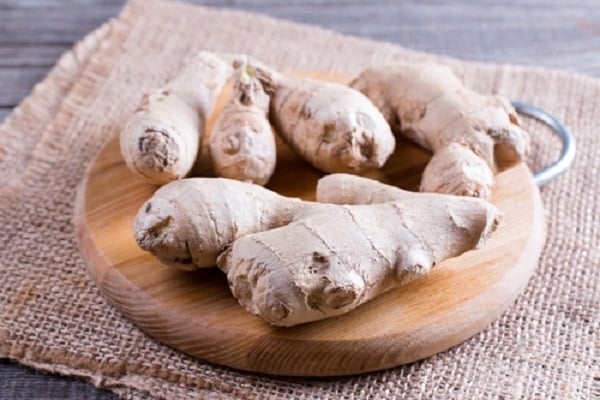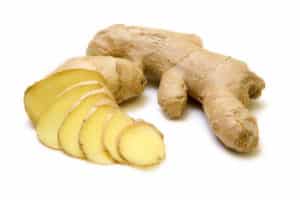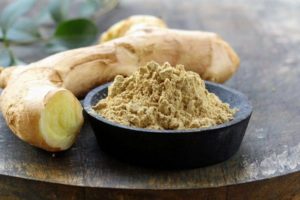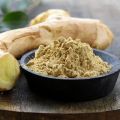The benefits and harms of ginger for the human body, medicinal properties and contraindications
In the popular American old tale, The Gingerbread Man, a fox eats a gingerbread. This is evidence that ginger, the benefits and harms of which concern many, has been used for food for a long time.
Content
- 1 General information
- 2 Healing ginger root
- 3 Useful properties of ginger
- 4 Ginger root: harm to the body
- 5 The benefits and harms of pickled ginger and candied candied fruits
- 6 The benefits and harms of ginger tea
- 7 Useful properties and contraindications of ginger for women
- 8 Useful properties and contraindications of ginger for men
- 9 How to eat ginger: recipes for health
- 10 How to store ginger root?
General information
The plant benefits people, and the feedback on the results of the application is positive. It is scientifically proven that the properties of ginger are due to the presence of many vitamins and minerals. Their greatest concentration is under the skin. During cleaning, it should not be carefully cut, it should be rinsed well and placed in cold water for an hour.
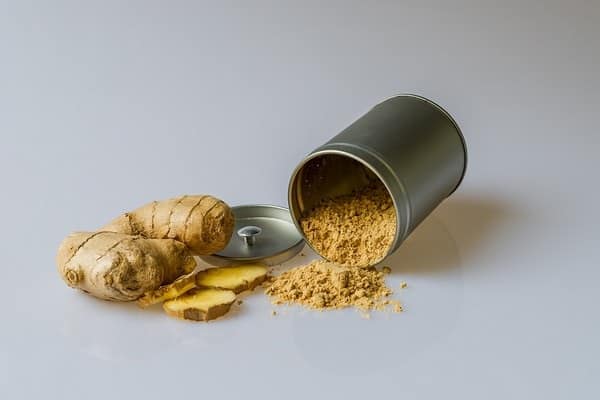
Ginger belongs to the Ginger family (Latin Zingiberaceae), along with cardamom and turmeric. It is grown on an industrial scale in countries located in the tropics and subtropics (India, Jamaica, Fiji, Indonesia, Australia).
The rhizome of the plant is eaten fresh, dry, in spices, in the form of juice or ginger essential oil. It is used for making tea, seasoning for spicy dishes, dried or candied. Some pharmaceutical manufacturers are used to mask the taste of bitter medicines such as syrups, capsules and hard candies. Helps reduce nausea, pain and inflammation.

Healing ginger root
Scientists have proven that the root heals many diseases. The characteristic taste and smell are provided by a number of specific organic compounds. This herb has powerful anti-inflammatory properties and is used to prevent bone disease.
Positive effects of the use (application) of ginger for medicinal purposes:
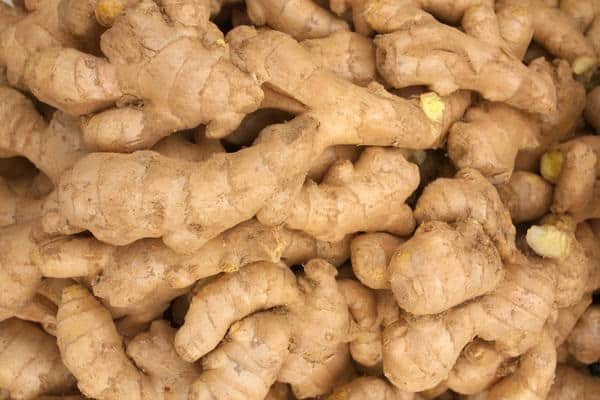
- Ginger infusions have been used since ancient times to treat diarrhea as they prevent stomach cramps.
- Helps with increased gas production. Eliminates unpleasant symptoms and prevents their recurrence.
- A proven digestive stimulant.
- Increases perspiration, especially when consumed with a hot drink.
- Fights fungal infections.
- The plant accelerates tissue regeneration, heals joint pain.
The healing properties of ginger can change when dried: anti-inflammatory and analgesic effects are enhanced, but the stimulation of digestion is reduced.
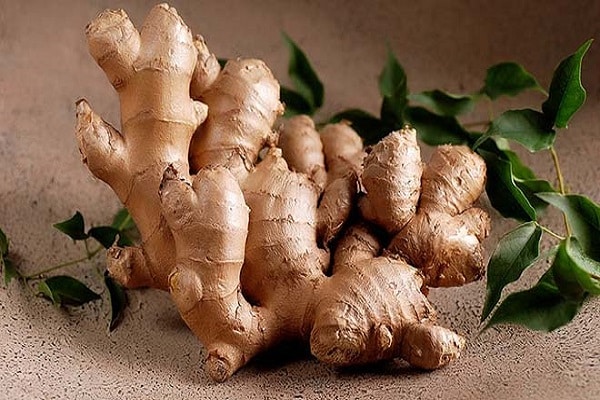
Useful properties of ginger
Even in ancient China, the effect of ginger on the human body was noticed. The patients were given a powder from this root.Studies have shown that consuming this root daily leads to a decrease in muscle soreness after exercise.
Ginger has the following effects on the body:
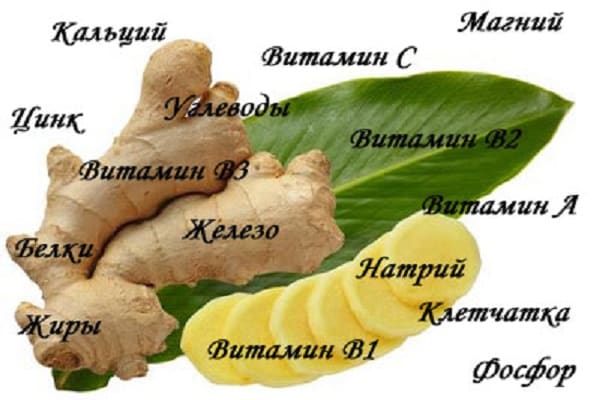
- Blood glucose levels above 5.5 mmol / L (on an empty stomach) cause unpleasant symptoms, including frequent urination, headaches, severe hunger, impaired consciousness, dizziness, and increased thirst. Ginger can help lower blood sugar levels to prevent all side effects.
- The beneficial properties of ginger are the ability to gently lower cholesterol levels and reduce the risk of cardiovascular problems.
- Neurodegenerative conditions such as Alzheimer's and Parkinson's are associated with oxidative stress and chronic brain inflammation. The presence of antioxidants and powerful anti-inflammatory effects can support human health.
The beneficial effect of ginger on the body is not limited to ingestion for therapeutic and prophylactic purposes. The root is also used in cosmetology. It is actively used in the fight against pigmentation, it is added to various masks and scrubs for the face, body and hair.

Ginger root: harm to the body
Despite the positive properties of ginger, the root can be harmful to those with stomach ailments or gallstones. The product causes the release of bile from the gallbladder, with stomach discomfort, heartburn and diarrhea.
If in doubt about your health, you should consult your doctor before consuming ginger. In moderation, this plant is safe.
Any medicinal product containing ginger (capsules, syrups) is dangerous due to possible side effects. You should start with the minimum dose and gradually increase it to track drug tolerance. On rare occasions, some people may be allergic to ginger. In case of alarming symptoms (choking, swelling or shortness of breath), you should immediately stop using and consult a doctor.
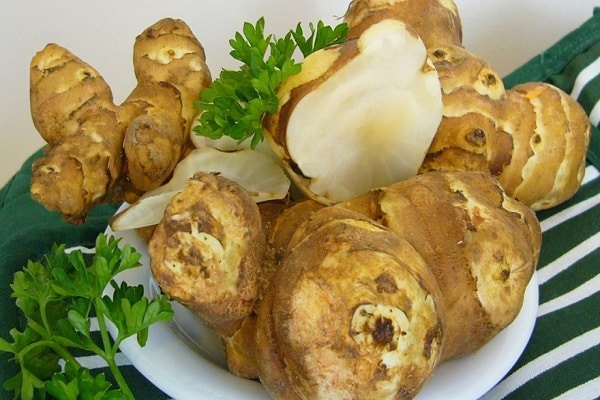
The benefits and harms of pickled ginger and candied candied fruits
Ginger is consumed unprocessed (raw) and pickled. Pickling Facts:
- The main purpose of this seasoning is to facilitate the digestion of fatty foods.
- With exacerbations of peptic ulcer, pancreatitis, it is better not to use it.
- When pickled ginger is consumed in large quantities, unpleasant symptoms can also appear in people with a healthy digestive system.
Ginger with sugar is not good for your health:
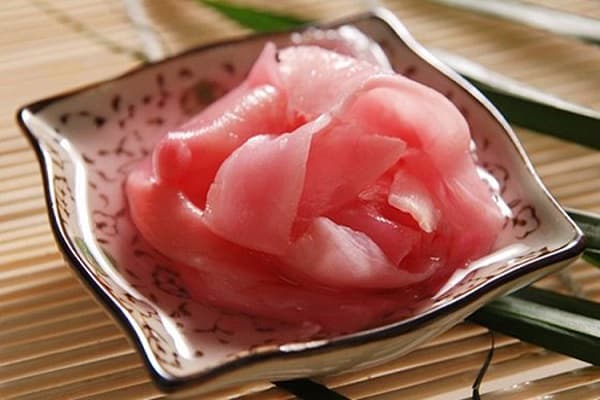
- Like other sweets, candied fruits from this root are not the best thing to eat if you are overweight. A healthy diet should include no more than 6 tsp. sugar every day for women and 9 tsp. for men.
- Just 100 grams of candied ginger contains 19 tsp. - more than the daily rate.
- Although candied fruits are not the best food, you can get no more than 16% of your daily iron requirement from them.
Candied ginger can be added occasionally to the diet, but not for daily consumption. The properties of ginger in sugar are not the same as in the fresh plant.

The benefits and harms of ginger tea
Ginger tea is effective for colds, especially when combined with drugs that stimulate the nervous system: cayenne pepper, garlic, lemon juice, honey. This herb relieves respiratory symptoms associated with allergies. Important and beneficial qualities of ginger are the restoration of blood circulation and reducing the likelihood of cardiovascular disease.
It is important to remember that harmful and dangerous properties of ginger tea can manifest themselves. For example, in case of fever, this drink is not recommended, because it can provoke a rise in temperature. Another side effect of ginger tea is that it causes sleep problems.It is better not to drink it at night, as the root has a tonic effect on the body.

Useful properties and contraindications of ginger for women
Scientists have found that ginger extract in middle-aged women may protect against brain aging, enhance cognition, and help improve cognitive function and focus.
Ginger helps reduce the level of prostaglandins in the body, which means it helps in relieving menstrual cramps. Research shows that the plant reduces the intensity and duration of pain cramps. Ginger is effective in treating nausea, motion sickness and is recommended for chemotherapy to reduce the risk of side effects.

Application features for pregnant women and women with children:
- During the first trimester of pregnancy, it eliminates toxicosis.
- At a later date, you need to remember about the possible harm of ginger. It can provoke spontaneous abortion or premature birth, and lead to other complications.
- Women in labor who have lost a lot of blood during childbirth should refrain from taking products with ginger.
- Caution should be exercised by women during lactation because using the herb can cause anxiety in the baby and gastrointestinal problems.

Useful properties and contraindications of ginger for men
Many people believe that ginger root can be used as an aphrodisiac. It enhances sexual performance and helps to increase the rate of blood circulation. The rhizome contains useful trace elements that are involved in the synthesis of male hormones responsible for the quality of sperm.
Essential amino acids and vitamins accelerate metabolism and improve the functioning of the prostate gland. In prostate cancer, the components of the essential oils gingerol and shogaol inhibit the growth of tumor cells without negatively affecting healthy tissue.
You need to remember about the harmful properties of ginger in the presence of the following diseases:

- malignant neoplasms;
- gastritis;
- cholelithiasis;
- acute or chronic prostatitis;
- diseases of the prostate gland;
- frequent bleeding.
To treat any ailments, including erectile dysfunction in men and prostatitis, with the help of ginger root is possible only after consulting a doctor. The constant use of a plant in the treatment of some problems and eating it can negatively affect the human condition, because the plant can have a negative effect on organs and systems, individual intolerance to some of its components can develop.

How to eat ginger: recipes for health
The safe dose of the product ranges from 250 mg to 1 g, the frequency of administration is 3-4 times a day. Exceeding this dose can lead to the loss of the benefits of ginger, and the harm from taking the root increases.
Dosage of ginger root per day, taking into account age and condition:
- for children from 2 to 6 years old, no more than 2 mg;
- for adults not more than 4 g;
- for pregnant women no more than 1 g.
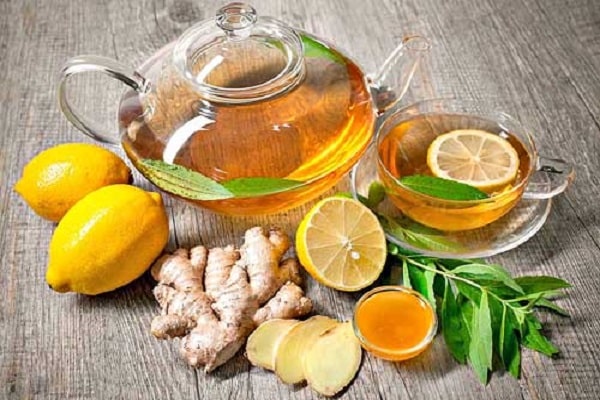
Ginger and honey food supplement is very popular. You should not put a lot of herbs and spices so that it can be consumed daily.
Ingredients:
- a small piece of fresh ginger root about 3 cm long (thoroughly washed);
- 2 glasses of water (filtered);
- 1 tsp rosemary (optional) and other spices to taste;
- 1 tsp honey (optional, for flavor).

Cut the root into 5-6 pieces, add water to a saucepan and bring to a boil, add rosemary and other spices. From the beginning of the boil, at least 10 minutes should pass, the water will become dark and have a rich ginger smell. After removing from the heat, the mixture must be cooled for 1-2 minutes.
You can take ginger with honey with a bite of tea.To do this, mix 200 g of fresh root with 200 g of honey and two lemons. No heat treatment is required, the mixture can be stored in the refrigerator for no more than 3 weeks.
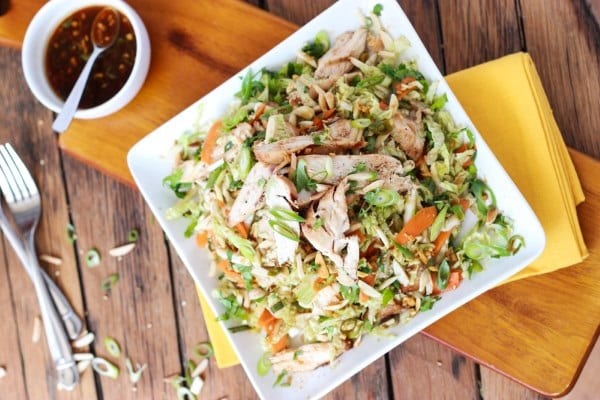
Several ways to use the root:
- With hot tea in autumn and winter. Add a slice of root to black or green tea.
- With hot mashed soups and Japanese cuisine.
- With fish. For example, with baked tilapia with cilantro.
- With meat.
- With pastries and desserts. For example, with gingerbread or pumpkin pie.
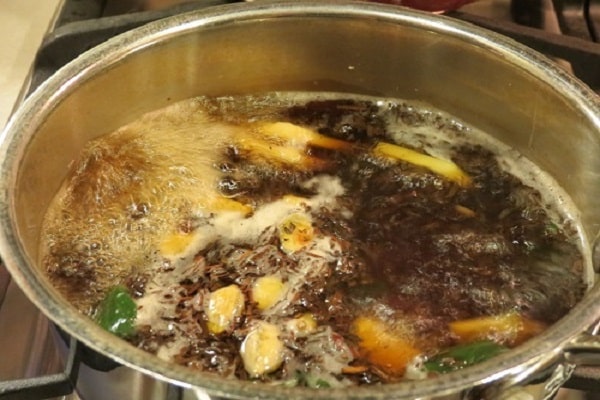
How to store ginger root?
The beneficial properties of fresh ginger persist for several weeks. If there is no choice, then you can purchase dried powder. It should not be light gray, but only sandy, light yellow, in a reliable sealed package.
What you need to do in order to get the most out of the plant:
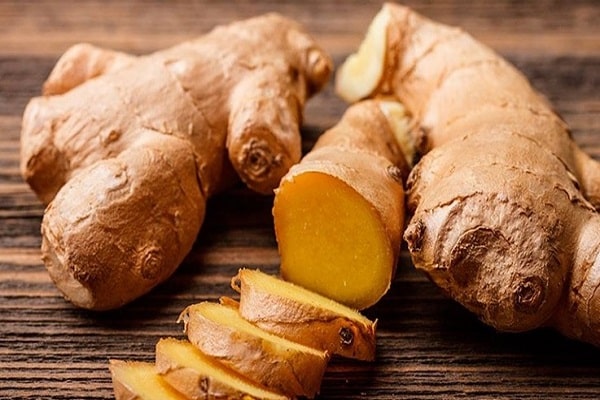
- Buy a root of excellent quality without damage and unpleasant odor. Choose firm, smooth, fresh roots. Preference should be given to a light and shiny root, since the dark ones have fewer nutrients.
- Store in the refrigerator for no more than 3 weeks. It is better to purchase more often than to buy large quantities and consume a plant that loses its properties over time.
- When chopping, it is better not to use a wooden cutting board that absorbs juice, it is worth using a grater. It helps to get rid of tough veins at the root.
- The piece remaining after use can be poured over with vodka or sherry so that the alcohol completely covers it. Can be added to tea or diluted with water and drunk to strengthen the immune system.
- You can store frozen food in the refrigerator for up to a year. The root does not lose its properties.
- To have a fresh plant all year round, you can plant the root in a small pot and place it on a windowsill.
The benefits and harms of ginger depend mainly on the condition of the body. In the presence of any disease, it is better not to risk it and consult a doctor. You need to know that the plant can be beneficial and harmful. It all depends on the method of use, whether there is an allergy to plant components and what quality the root is.
